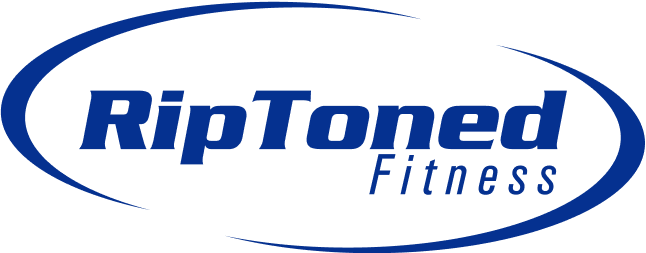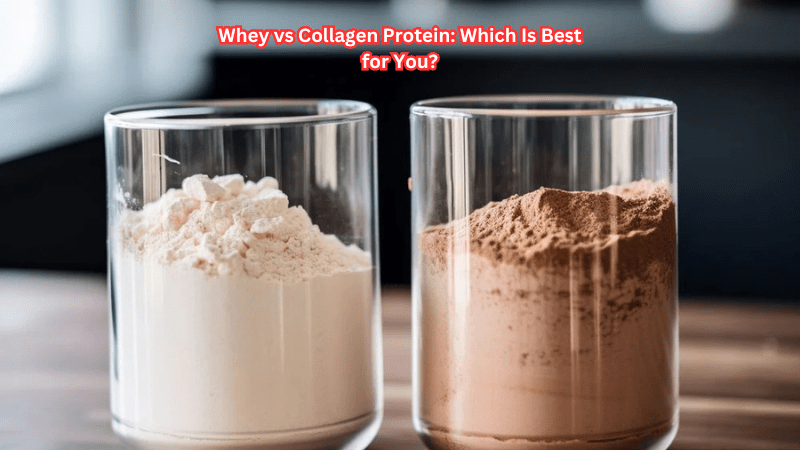Wondering whether to choose whey or collagen protein? This article compares whey vs collagen protein, breaking down their benefits for muscle growth, joint health, and overall wellness. Discover which protein best suits your fitness and health goals.
Key Takeaways
- Whey protein is a complete protein that supports muscle growth and recovery due to its high absorption rate and amino acid profile, making it ideal for athletes.
- Collagen protein, while lacking one essential amino acid, provides unique amino acids beneficial for connective tissue health, skin elasticity, and joint support.
- Combining whey and collagen proteins enhances the amino acid profile and optimizes benefits for muscle growth and joint health, allowing for a comprehensive approach to supplementation.
Understanding Whey Protein
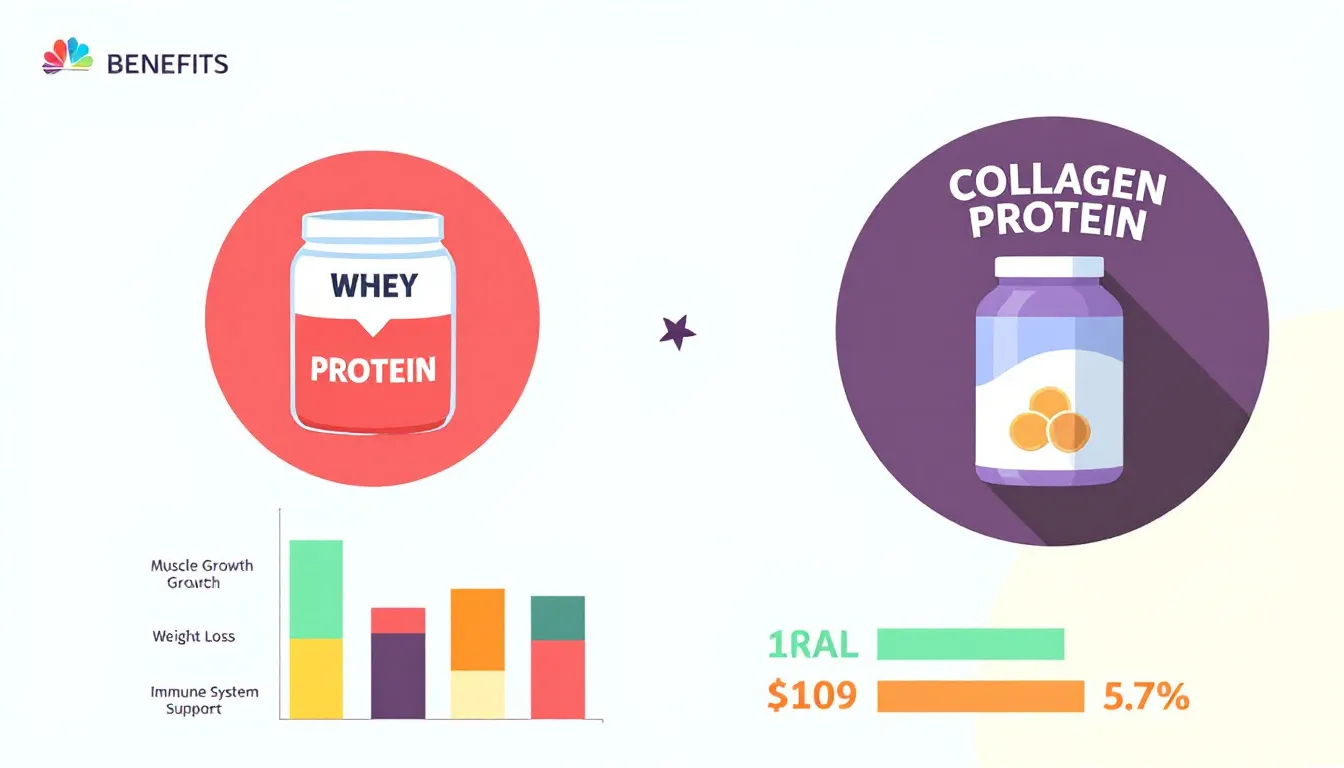
Whey protein, derived from milk, stands as one of the highest-quality protein sources available. It is classified as a complete protein, containing all nine essential amino acids necessary for human health. It is an excellent choice for those looking to support muscle protein synthesis and overall protein intake.
We can explore the different types of whey protein vs whey protein and their benefits.
Types of Whey Protein
Whey protein powder comes in various forms, with whey protein concentrate being the most common. This form provides about 70-80% protein content, making it a rich source of protein and highly efficient post-consumption due to its high absorption rate.
Other forms include whey protein isolate and hydrolysate, each offering unique benefits, such as higher protein content or faster absorption rates.
Benefits of Whey Protein Supplementation
Whey protein is renowned for its significant contribution to muscle growth and recovery. Athletes commonly use whey protein supplements to support muscle building and overall recovery due to its rapid absorption rate and high-quality amino acid profile. Its ability to promote effective recovery post-exercise makes it a staple in many fitness regimens.
Whey protein’s complete amino acid profile provides the necessary nutrients for muscle protein synthesis, making it beneficial for those engaged in intense physical activities. Consuming whey protein after workouts can enhance muscle recovery and growth.
Exploring Collagen Protein
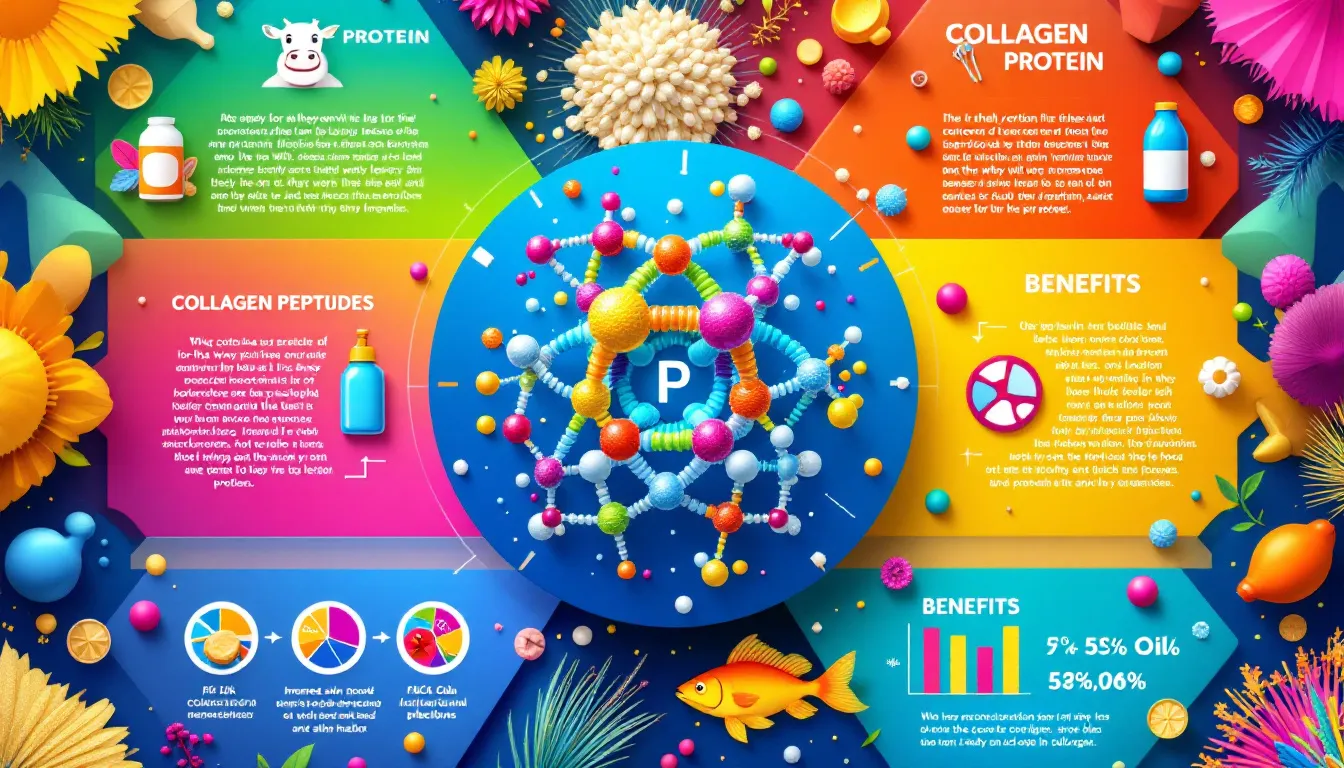
Collagen protein is the most abundant protein in the body, creating structure for tissues, and is primarily found in skin, cartilage, and bones. Unlike whey, collagen protein is mainly derived from cow or fish connective tissues, providing vital amino acids like proline and glycine, which support connective tissue health.
We will examine the different types of collagen protein and their benefits.
Common Types of Collagen Protein
There are 29 identified types of collagen, with Type I providing strength to skin and bones and Type II supporting flexible cartilage in joints. Type I collagen makes up about 90% of the body’s collagen and is mainly found in skin and bones. At the same time, Type III contributes to the structure and elasticity of muscles, arteries, and organs.
Types I and III are the most commonly found in collagen products.
Benefits of Collagen Supplementation
Collagen supplementation can significantly improve skin elasticity, hydrate skin, strengthen joints, and support bone health. Regular collagen supplementation can improve skin hydration and elasticity, potentially reducing the appearance of wrinkles thus supporting cosmetic and physical health.
Additionally, collagen supplements can improve joint pain, flexibility, and the strength of ligaments and tendons. Collagen protein is essential for maintaining strong bones and may counteract bone density loss associated with aging through collagen peptide supplementation.
Adding collagen to your routine can significantly enhance overall connective tissue health.
Comparing Amino Acid Profiles
The whey protein comprises all nine essential amino acids, while collagen protein lacks one essential amino acid, tryptophan. This difference is crucial for effective muscle protein synthesis, which requires all nine essential amino acids.
Combining whey and collagen proteins results in a more diverse amino acid profile.
Essential Amino Acids in Whey
Whey protein is a complete protein source containing all nine essential amino acids, including leucine, which is particularly abundant. Leucine is a key amino acid that significantly supports muscle protein synthesis, making whey protein an excellent choice for muscle growth and recovery.
Unique Amino Acids in Collagen
Collagen protein contains unique amino acids glycine that is absent in whey, such as glycine, proline, hydroxyproline, and arginine. These amino acids are vital for connective tissue health and repair, with proline essential for whole-body protein synthesis and glycine contributing to maintaining a positive nitrogen balance.
Absorption and Digestibility
Understanding the absorption and digestibility of these proteins can help you maximize their benefits. Whey protein is known for its fast absorption rate due to its high concentration of essential amino acids and liquid form.
On the other hand, hydrolyzed collagen protein is particularly easy to digest and absorb, making it beneficial for those needing quick nourishment.
Absorption Rates of Whey Protein
Whey protein has a high rate of digestibility and is rapidly absorbed by the body compared to other proteins. Typically, it takes just over two hours for the body to absorb a typical dose of whey protein and about 1.5 hours to digest whey protein shakes.
The absorption rate can be improved by adding digestive enzymes, with whey protein hydrolysates processed for even faster absorption.
Digestibility of Collagen Protein
Hydrolyzed collagen is designed for efficient digestion and absorption. Its smaller peptides make it easier for the body to absorb compared to non-hydrolyzed types. This pre-digested form provides a significant advantage for those seeking effective supplementation, breaking down easily in the digestive system and enhancing its absorption efficiency.
Specific Health Benefits
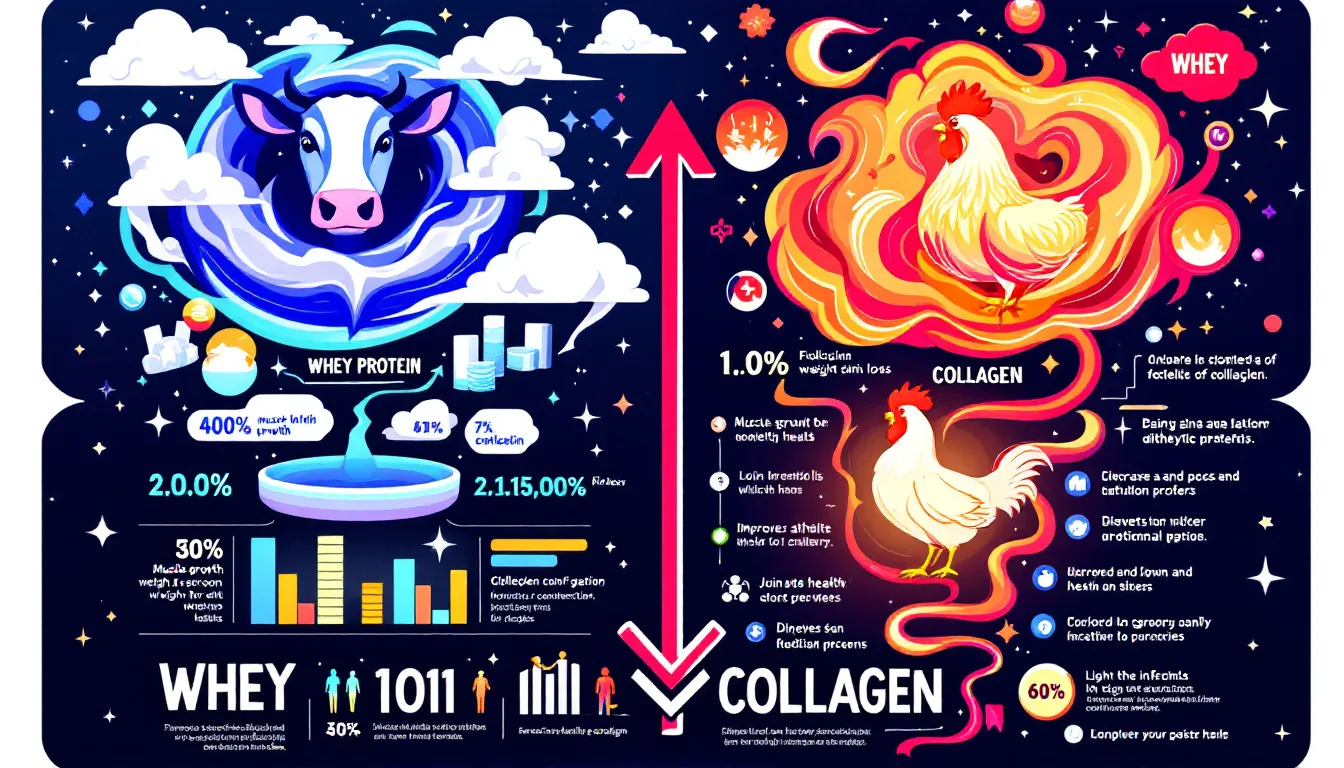
Both whey and collagen proteins offer specific health benefits that can complement each other. While whey protein supports muscle recovery and growth by providing essential amino acids and promoting muscle protein synthesis, collagen protein aids in improving joint health and skin elasticity. When considering collagen protein vs whey, it’s important to recognize their unique contributions to overall health.
We can further explore these benefits.
Muscle Growth and Recovery with Whey
Whey protein supplementation promotes muscle mass retention and growth, particularly with resistance training. Its complete amino acid profile and rapid absorption rate make it ideal for muscle building and recovery. Athletes often consume whey protein post-workout to supply muscles with essential amino acids, aiding in repair and growth.
Whey protein stimulates higher rates of protein synthesis, which is critical for muscle recovery. Its rapid absorption into the bloodstream, peaking approximately 1.5 hours post-consumption, ensures timely delivery of nutrients to the muscles. Moreover, whey protein contains high levels of branched-chain amino acids, which are crucial for initiating muscle repair and growth after exercise.
Joint and Skin Health with Collagen
Collagen protein has been shown to stimulate the production of skin proteins like elastin and fibrillin, contributing to improved skin health post-absorption. Daily collagen supplementation can support skin elasticity and joint functionality, making it beneficial for maintaining cosmetic and physical health. It can significantly improve joint pain and enhance the overall health of connective tissues.
For joint health, collagen protein is best consumed 30-60 minutes before physical activity to maximize its benefits. Its easy digestibility and support for connective tissues make it ideal for those with joint issues.
Incorporating collagen into your routine can also improve skin hydration and elasticity, potentially reducing the appearance of wrinkles and promoting overall skin health.
Practical Uses and Recommendations
Whey and collagen proteins can be added to protein shakes and smoothies. They are also useful in various recipes as convenient sources of protein. High-quality hydrolyzed collagen is recommended for supplementation to ensure optimal benefits. Mixing whey and collagen proteins with water or milk offers easy preparation. They should supplement, not replace, a balanced diet.
When to Consume Whey Protein
Whey protein is particularly effective for muscle recovery and should be taken immediately after workouts. For best results, consume whey protein immediately after exercise, as it is highly effective for muscle-building post-workout.
For maximum benefits, take collagen and whey protein on an empty stomach around workout times. When mixing, balance the amounts to avoid excessive protein intake, such as 20g of whey with 5g of collagen.
Best Times to Take Collagen Protein
For joint support, collagen protein is best consumed 30-60 minutes before physical activity. Timing is crucial to maximize its benefits, with evening intake potentially enhancing skin health and elasticity.
Incorporating collagen protein at optimal times can contribute to better joint support during exercise and improved skin health at night.
Combining Whey and Collagen Protein

Combining whey and collagen peptides proteins offers a more comprehensive amino acid range, optimizing muscle growth while supporting joint and skin health.
This combination can be particularly beneficial for athletes and active individuals.
Synergistic Effects
Including whey and collagen proteins in your diet offers a broader range of amino acids, optimizing muscle growth and supporting joint and skin health. Whey aids muscle growth and recovery, while collagen enhances skin elasticity and joint support.
To maximize the benefits, consider adding whey and collagen protein powders to smoothies, shakes, or post-workout meals.
Practical Tips for Mixing
You can mix whey and collagen into smoothies, oatmeal, or baked goods for added nutritional value, making it easy to incorporate both into your daily routine.
Potential Side Effects
While whey and collagen proteins offer numerous benefits, they can also have potential side effects. High doses of whey protein may lead to increased bowel movements, nausea, and headaches. Both protein supplements might cause digestive discomfort for some, so understanding your body’s reaction to each is important.
Side Effects of Whey Protein
Common digestive issues caused by whey protein include bloating, gas, and diarrhea. Individuals with lactose intolerance can experience several symptoms after consuming whey protein. These symptoms may include gas, bloating, diarrhea, and stomach cramps. Those sensitive to lactose or with a milk allergy should avoid whey protein.
When combining whey and collagen, balance serving sizes to avoid digestive issues, possibly by reducing whey intake slightly.
Side Effects of Collagen Protein
Common side effects of collagen protein supplements may be bloating. An upset stomach is another potential effect. Allergic reactions to collagen supplements can occur, particularly in individuals sensitive to certain sources of collagen.
Some individuals may experience allergic reactions to collagen derived from fish or shellfish.
Summary
In summary, both whey and collagen proteins offer unique benefits and can play crucial roles in supporting your health and fitness goals. Whey protein, with its complete amino acid profile, is excellent for muscle growth and recovery, making it a preferred choice for athletes and bodybuilders. On the other hand, collagen protein supports joint health, skin elasticity, and overall connective tissue maintenance, making it ideal for those looking to improve their skin and joint health.
When deciding between whey and collagen protein, consider your specific health objectives. If muscle growth and recovery are your primary goals, whey protein is the way. However, if you’re looking to enhance your skin’s elasticity, support joint health, or combat the effects of aging, collagen protein may be more suitable. Combining both proteins can offer synergistic benefits, providing a comprehensive approach to your protein supplementation needs.
Frequently Asked Questions
Can I take whey and collagen proteins together?
Yes, whey and collagen proteins can be taken together, as this combination enhances amino acid diversity, benefiting muscle growth, joint health, and skin appearance.
What is the best time to consume whey protein?
The optimal time to consume whey protein is immediately after workouts to enhance muscle recovery and promote growth.
What are the common side effects of collagen protein?
Common side effects of collagen protein include bloating, upset stomach, and potential allergic reactions, particularly if the collagen source is fish or shellfish. It is advisable to monitor for such symptoms when incorporating collagen into your diet.
How does collagen protein benefit skin health?
Collagen protein significantly enhances skin elasticity and hydration while also reducing the appearance of wrinkles, thereby promoting overall skin health.
Are there any dietary restrictions when taking whey protein?
It is advisable for individuals with lactose intolerance or milk allergies to avoid whey protein due to potential digestive issues. Such restrictions are important for maintaining overall health and comfort.

